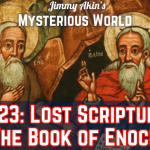
 Jimmy Akin's Mysterious World
Jimmy Akin's Mysterious World Lost Scripture: The Book of Enoch
17 snips
Aug 2, 2024 Jimmy Akin, a biblical commentator, and Dom Bettinelli, a host with expertise in religious themes, dive into the mysterious Book of Enoch. They explore Enoch's captivating narrative as a figure taken by God, touching on themes of morality and divine judgment. The discussion connects Enoch to early biblical texts, delves into the enigmatic 'sons of God' from Genesis, and highlights the book's prophetic implications regarding the Flood. Their insights reveal the deep historical and theological significance of this lost scripture.
AI Snips
Chapters
Transcript
Episode notes
Enoch's Short Life Is Symbolic
- Genesis portrays Enoch as unique: he 'walked with God' and was taken rather than dying.
- His 365-year lifespan likely symbolizes the solar year and carries theological meaning, not literal biography.
Primordial History Uses Symbolic Language
- Early Genesis uses primordial history with symbolic language, so ages and details aren't strictly literal.
- Pope Pius XII and modern scholars treat Genesis 1–11 as theological-historical material requiring exegetical study.
Patriarchal Ages Encode Cosmic Meaning
- Enoch's 365 years likely ties him to the solar calendar, reflecting ancient calendar disputes.
- Patriarchal ages may encode cosmic symbolism to rival neighboring cultures' legendary lifespans.


 Who was Enoch, what is his book, and why is it a "lost scripture"? Jimmy Akin and Dom Bettinelli discuss the mysterious Enoch, the references to him in the New Testament, and what makes his book so fascinating and mysterious.
Who was Enoch, what is his book, and why is it a "lost scripture"? Jimmy Akin and Dom Bettinelli discuss the mysterious Enoch, the references to him in the New Testament, and what makes his book so fascinating and mysterious.